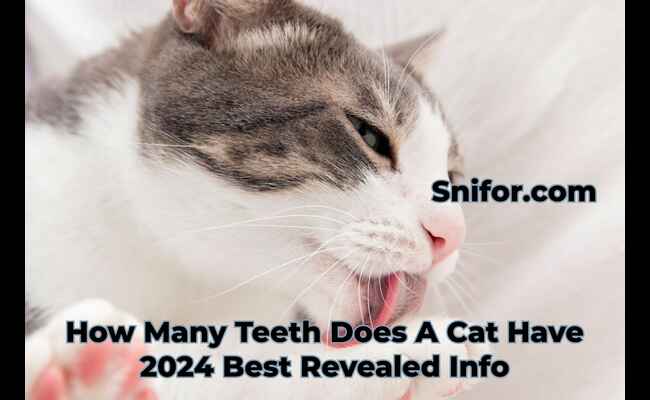
How Much Is A Book Of Stamps 2024 Best Stamp Cost Info
January 9, 2024
Ed Sheeran Details The Lovestruck Jitters In Sweet New Single 2024
January 9, 2024How Many Teeth Do Cats Have? 2024 Best Revealed Info Cat Dental Care
Today our topic is about How Many Teeth Does A Cat Have 2024? Have you ever wondered, how many teeth do cats have in total? Cats, like humans and other mammals, have two sets of teeth in their lifetime. Let’s delve into the world of cat dental care and explore the number of teeth, dental care needs, dental development, common dental problems, and tips to support your cat’s dental health.

How Many Teeth Does A Cat Have
How Many Teeth Do Cats Have in Total? How Many Teeth Does A Cat Have?
Cats have 30 permanent teeth, which include canines, incisors, and molars. As adult cats, they have 12 incisors, 4 canines, 10 premolars, and 4 molars. These teeth are designed to help cats grasp and chew their food effectively, ensuring their overall health and well-being.
Also Read: How Much Is A Book Of Stamps
Number of Adult Teeth in Cats
The total count of teeth, especially the 30 adult teeth in cats, is essential to understand for their proper dental care. Adult cats have 30 teeth in total, with a specific distribution of incisors, canines, premolars, and molars.
Do Cats Have Baby Teeth?
Just like humans, cats also have baby teeth, also known as deciduous teeth. Kittens are born with 26 deciduous teeth, which start to appear when they are around 2 to 4 weeks old. These baby teeth are temporary and eventually fall out, making way for the development of permanent adult teeth.
Types of Teeth in Cats
Within the feline dental structure, cats have two sets of teeth: deciduous teeth and permanent adult teeth. The types of teeth include incisors, canine teeth, premolars, and molars, each serving different roles in the cat’s oral health and eating habits.
Also Read: How Many Shots Are In A Fifth
What Dental Care Do Cats Need?
Proper dental care is crucial for maintaining your cat’s oral health. Whether you have adult cats or kittens, providing appropriate dental care can prevent tooth loss and dental problems throughout their lives.
Dental Care for Adult Cats
For adult cats, dental care involves regular brushing, providing dental treats or toys, and scheduling periodic veterinary dental examinations. These measures can aid in preventing oral health issues such as gingivitis, periodontal disease, and tooth resorption.
Dental Care for Kittens
Kittens require special dental care to ensure the healthy development of their teeth. This includes gentle brushing, promoting good chewing habits, and offering appropriate kitten-friendly dental products recommended by veterinarians.
Preventing Tooth Loss in Cats
To prevent tooth loss in cats, it is important to provide ongoing dental care, monitor their oral health, and address any dental issues promptly. With proper care and attention, you can help your feline companion maintain healthy teeth throughout their life.
Also Read: Best Anonymous Instagram Story Viewer
When Do Cat’s Teeth Develop?
The development of a cat’s teeth occurs in stages, and understanding these milestones is essential for ensuring their dental health from kittenhood to adulthood.
Development of Kitten Teeth
Kittens start developing their deciduous teeth at a very young age, usually around 2 to 4 weeks old. These tiny teeth are crucial for their early growth and nutrition, preparing them for the eventual transition to permanent adult teeth.
Milestones in Cat’s Dental Development
As kittens grow, their baby teeth start falling out, and the permanent adult teeth emerge, gradually replacing the deciduous teeth. This natural process is an essential part of a cat’s dental development and oral health.
Typical Oral Health Issues in Cats
Cats may experience common oral health issues such as gingivitis, periodontal disease, and tooth resorption. Monitoring their dental health and addressing any signs of discomfort or dental problems with your veterinarian is crucial to ensuring their well-being.
What Are the Common Dental Problems in Cats?
There are several dental problems that can affect cats, and being aware of these issues can help you take proactive measures to support your feline friend’s dental health.
Gingivitis and Periodontal Disease in Cats
Gingivitis and periodontal disease are common in cats and can lead to discomfort and tooth loss if left untreated. Regular dental care and professional cleanings are vital for preventing and managing these conditions.
Also Read: What Is A Group Of Cats Called
Tooth Resorption in Cats
Tooth resorption, a painful condition where the tooth structure breaks down, can affect many cats. Early detection and intervention by a veterinarian are essential in managing tooth resorption and preserving your cat’s oral health.
Managing Dental Health in Senior Cats
As cats age, dental issues may become more prevalent. Providing enhanced dental care and addressing any dental problems promptly can help in maintaining the oral health of senior cats and ensuring their comfort and well-being.
How Can You Support Your Cat’s Dental Health?
Supporting your cat’s dental health involves various proactive steps to keep their teeth and gums healthy and free from dental problems.
Oral Hygiene Suggestions for Cats
Establishing a routine for brushing your cat’s teeth, providing dental-friendly treats and toys, and incorporating dental care products recommended by veterinarians can contribute to their oral hygiene and overall dental well-being.
Importance of Regular Veterinary Dental Examinations
Scheduling regular veterinary dental examinations can help in early detection of any dental issues and ensure timely interventions, ultimately supporting your cat’s long-term dental health.
Feeding and Treat Choices for Dental Health
Choosing appropriate cat food and treats designed to promote dental health, along with providing access to clean water, can make a significant difference in maintaining healthy teeth and gums in cats.
Q: How many teeth do adult cats have?
A: Adult cats have 30 teeth consisting of canines, incisors (front teeth), premolars, and the rest of the teeth being molars.
Also Read: How To Check Tin Number Online Philippines
Q: What are the different types of cat teeth?
A: Cats have four types of teeth: teeth in the front known as incisors, canine teeth located next to them, premolars in the back of the mouth, and molars making up the rest of the teeth at the rear of the mouth.
Q: How many teeth do kittens have?
A: Kittens have 26 deciduous (baby) teeth, which are gradually replaced by 30 permanent teeth as they grow into adults.
Q: Why is dental care important for your cat?
A: Proper dental care for your cat is essential to prevent dental issues, maintain good overall health, and prevent painful teeth problems.
Q: How can I keep my cat’s teeth healthy?
A: You can keep your cat’s teeth healthy by brushing their teeth regularly, providing dental treats and toys, and making sure your cat has regular dental check-ups at an animal hospital.
Q: What should I do if my cat starts losing their baby teeth?
A: As your cat starts losing their baby teeth, provide soft foods if they experience any discomfort and avoid playing with any toys that could damage their teeth during this time.
Q: At what age do kittens start losing their baby teeth?
A: Kittens start losing their baby teeth around 3 to 4 months of age, and by 6 to 9 months, they should have their complete set of adult teeth.
Q: What are some signs that my cat may have dental issues?
A: Some signs of dental issues in cats include bad breath, drooling, pawing at the mouth, red or swollen gums, and reluctance to eat hard food.
Q: Can I clean my cat’s teeth at home?
A: Yes, you can clean your cat’s teeth at home using specially designed toothbrushes and toothpaste for cats. It’s important to start slowly and make it a positive experience for your cat.
Q: What should I do if my cat has a painful tooth?
A: If your cat has a painful tooth, it’s important to seek veterinary care as soon as possible to address the issue and alleviate any discomfort.
Hope you enjoy reading our article How Many Teeth Does A Cat Have 2024.



